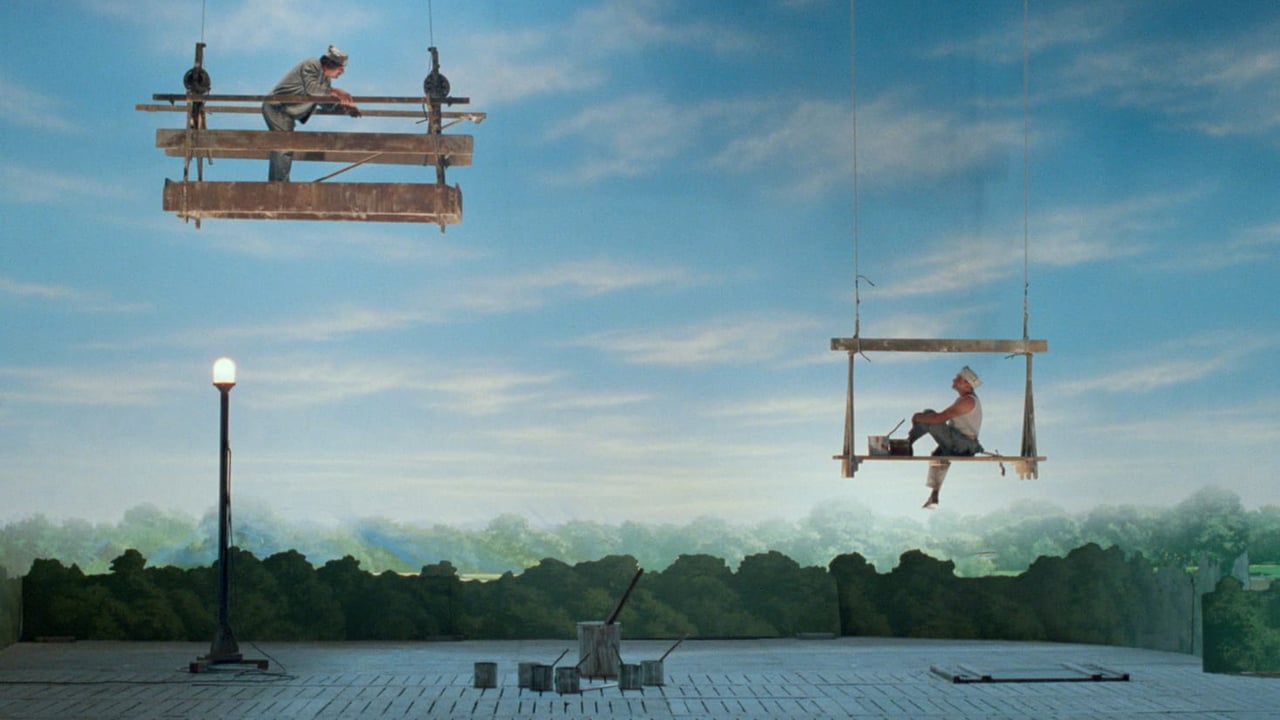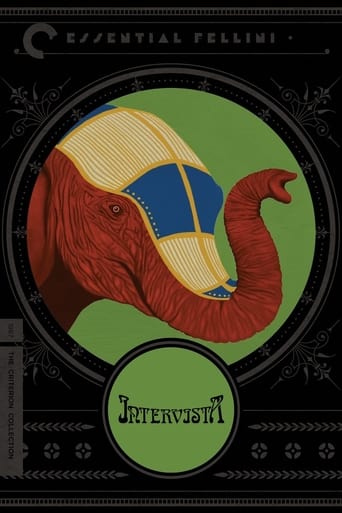GamerTab
That was an excellent one.
Glucedee
It's hard to see any effort in the film. There's no comedy to speak of, no real drama and, worst of all.
Derry Herrera
Not sure how, but this is easily one of the best movies all summer. Multiple levels of funny, never takes itself seriously, super colorful, and creative.
Staci Frederick
Blistering performances.
Rodrigo Amaro
"Intervista" ("Interview") takes life and movies to an unimagined extent. An nostalgic journey into memory, experiences and life in the way Federico Fellini sees them. And he asks those kind of questions: "What's real in movies? What's real in news and documentaries?". Even more: "What's real in life?" Defying, joking, molding, constructing and deconstructing films and the human existence, Fellini challenges and fascinates viewers through four intertwined segments which echo his work, his art and his early memories when of his arrival at the famous studio Cinecittá, way before of becoming the cinematic author of "Amarcord" and "Satyricon".The movie is composed of showing the behind the scenes of a movie directed by the maestro Fellini; the movie itself (film within the film) and its long and confusing process of shooting; the interview documented by the Japanese crew who hears the director's stories that later are intercut with scenes of a young Fellini (played by the lovable Sergio Rubini) living his first experiences at Cinecittá while interviewing a impressionable film star. They're all mixed into an magical and dreamy imitation of life.But how can one distinguish what's scripted and what's real? You can't. But you can try. The reunion between Marcello Mastroianni and Anita Ekberg, 27 seven years later after "La Dolce Vita" is wonderful, almost brings tears to our eyes. But they really kept all this time without seeing each other as they say? Maybe, maybe not, very unlikely but somehow we buy this as a fact. It looks genuine, they're so thrilled and surprised with this event. They play themselves in the movie, watching the characters they played in another Fellini classic, when they were very young. That's the film's magic, to capture both these stars in different situations and periods of life, all captured in a beautiful frame where Marcello can play magic tricks and prepare a delightful and nostalgic surprise to Anita and then watch the famous sequence of the Fontana de Trevi that the two performed in 1960. This dialog between medias and time is hypnotic, mysterious and funny too. It's a perfect fusion of realities, facts and fiction friendly put together in one single film.One of Fellini's finest and a treasure to be sought. 9/10
MartinHafer
This was the second to last film the famed director, Fellini, made and it was his most personal. Instead of being a traditional film, this is much more like having a personal visit with him as he shows you around Cinecittà Studios in Rome. Sometimes he talks to the camera (or in many cases, the fictional Japanese crew interviewing him--a plot device to represent the audience), sometimes you just watch somewhat random scenes as they are shot and other times you watch Fellini and his friends as they reminisce--such as when Marcello Mastroianni pops by the set and Fellini, impulsively, takes him on a road trip to see Anita Ekberg. While this all seems unscripted and at the spur of the moment, it was all staged for the film but it has a real home movie quality about it. At Ekberg's home, all of Fellini's guests view scenes from LA DULCE VITA (starring Mastroianni and Ekberg) and there is a very strong nostalgic air about the party.The total effect of all these elements was a lot like climbing inside Fellini's mind and it also gave a lot of amazing insights into the film making process. Because of this it was a lot like Truffaut's DAY FOR NIGHT, though a bit different because DAY FOR NIGHT stuck more to a traditional script (a movie about a movie being filmed) and seemed a lot less frivolous and fun. Fellini's is more of a "warts and all" and appears to be more spontaneous and ad-libbed--though because of some of the grand sets and the visit to Ekberg's, it obviously was staged to look spontaneous. My advice is to see this film and DAY FOR NIGHT. DAY FOR NIGHT is rated higher, but because of all the sentimentality of INTERVISTA, I preferred it slightly.While I have never been a huge fan of Fellini, I have seen most of his films and really enjoyed having some insights into his psyche. Most of it came as no surprise (such as the use of phallic imagery--Fellini's sexuality was never repressed in his films), but some was very sweet and charming. It was nice to see him as both director and actor--so why is the film rated so poorly??!! By the way, when the film was made, Miss Ekberg was 56 years-old and Mr. Mastroianni was 63. I was rather irritated with an IMDb review that complained about her being "obese" and him being "wrinkled". This was cruel and shallow, as most women would die to look that ravishing at 56 and most men would love to be a charming old rogue at 63! What do you expect at that age? Hmm? To quote Ekberg in a recent interview, "I'm very much bigger than I was, so what? It's not really fatness, it's development." Bravo.PS--If you like this film, try watching Vincenzo Mollica's documentary on the film that's included on the DVD for INTERVISTA. It does a nice job of explaining some of the plot elements and features clips not only from this movie but several other Fellini films. My favorite part was learning that Miss Ekberg's plunge into the Trevi fountain in LA DULCE VITA was done in February!!
roger-212
An elegiac look-back by the Maestro on where his films were shot (Cinecitta), Intervista has the most meta-fictional plot devices Fellini's used yet. --It features Fellini himself, shooting a film "recounting" a location (as in "Roma") but here he is more forefront. --The rather casual stream-of-consciousness meandering of the happenings hearkens to "Amarcord," which is similar to this, with a wistful look back on the past, with fascists, bus rides, buxom women, etc. "Intervista" truly seems like an alternate draft of "Amarcord" with Fellini personally added. --The "young Fellini" going on an interview, being shot by Fellini during an interview in present day, and the playful and insistent 3rd-wall being broken every so often.--And of course Marcello and Anita as themselves. For fans of Fellini, this is an absolute must-see. Its reflection on his work, himself, and making films makes it one of the most playful, subversive, and autobiographical films in Fellini's late career.(Originally a t.v. production, it displays a smaller scale that can only be attributed to the budget (too bad) and a need to make things "play" on a smaller screen. Although very similar to "A Director's Notebook", another filmic essay (that was a rough draft for "Roma"), this one is more assured and stands on its own. )
jaapparqui
Intervista is one of the best films I've ever seen. The strong sense in all Fellini films that reality is like a big, sad circus is even stronger in this film because fact and fiction, past and present become so confused. The fictitious carnival appears to be reality. And isn't that maybe quite a realistic view?There is not only the usual sense of nostalgia: because the film looks back at decades of Fellini nostalgia, the nostalgia is double. Who can watch the older Anita and Marcello looking back at La Dolce Vita with dry eyes? The only possible critic could be that the film is, like all Fellini movies, little coherent, but then, isn't that as well like life itself?Intervista maybe isn't the most famous Fellini films, it certainly is one of the better ones and with that one of the best films in cinematographic history.

